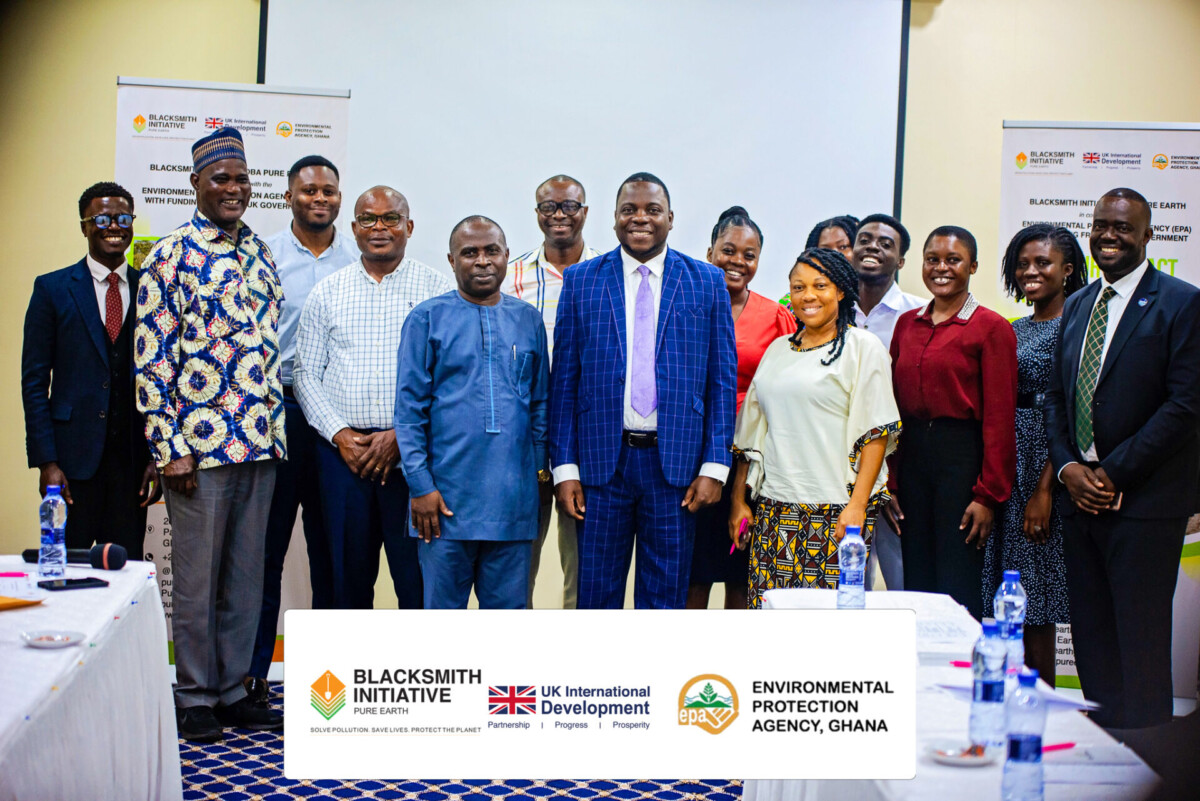Accra, Ghana — On August 27th, 2024, a significant stride towards environmental sustainability and public health was made as Blacksmith Initiative dba Pure Earth launched the Mercury Impact Assessment Study Project in Accra. The project, funded by the Foreign Commonwealth Development Office (FCDO) through The Evident Fund (EvF), is a collaborative effort spearheaded by the Blacksmith Initiative dba Pure Earth Ghana and the Ghana Environmental Protection Agency (EPA). This initiative aims to meticulously assess mercury contamination in selected mining sites across Ghana, particularly within the artisanal and small-scale gold mining (ASGM) sector.

Mercury, a toxic heavy metal, poses significant risks to human health, particularly when individuals are exposed to it. In Ghana, mercury pollution largely stems from artisanal and small-scale gold mining (ASGM), which is prevalent across 13 regions. In addressing this, the Mercury Impact Assessment Project was initiated to assess contamination levels in key environmental matrices such as crops, water, soil, and fish. This evaluation aims to understand how mercury interacts with our food systems. The project focuses on four hotspot regions known for mercury pollution: Eastern, Western, Ashanti, and Savannah.
In the welcome address at the launch, Rev. Dr. Esmond Wisdom Quansah, Country Director of Pure Earth Ghana, set the tone for the event by highlighting the urgency and significance of the project. Rev. Dr. Quansah emphasized that the project is not just about understanding the problem of mercury contamination but about finding actionable solutions to safeguard both the environment and the health of communities dependent on these ecosystems.
“The launch of the Mercury Impact Assessment Study Project marks a pivotal moment in our joint journey toward environmental sustainability and public health,” Dr. Quansah stated. He praised the collaboration between the EPA and the UK Government, noting that their support enables deeper penetration into the ASGM sector, which has long evaded comprehensive study. The project aims to bridge the knowledge gap on mercury pollution and its impact on food safety, providing critical data to inform policy and enhance implementation strategies.

The Technical Project Team
Speaking on behalf of the Executive Director of EPA, Mr. Kingsley Ekow Gurah-Sey, Director/ Environmental Assessment, underscored the dual-edged nature of the mining industry in Ghana. While acknowledging the sector’s contribution to the economy accounting for 37% of exports and 8% of GDP, he didn’t shy away from addressing the dire consequences of illegal mining activities, commonly known as ‘galamsey.’
“Mercury is a substance used to process gold, especially by Artisanal Small-Scale Mining operations in Ghana. The release of this chemical into the environment during mining operations can have a detrimental effect on human health. Mercury contamination in our water bodies and food chain poses a serious public health threat,” he warned.
Mr. Gurah-Sey called attention to the country’s dwindling water resources due to illegal mining and emphasized the need for immediate, practical solutions. He expressed optimism that the research findings would enable the EPA to develop a roadmap for remediation and restoration of contaminated sites, with hopes that these areas could be transformed into Horticulture Research centers, promoting sustainable agricultural practices.
Representing the UK Government, Dr. Tristan Eagling from the Foreign, Commonwealth & Development Office (FCDO) provided a global context to the issue (mercury contamination). He highlighted the economic drivers of illegal mining, noting the fivefold increase in gold prices over the past two decades, which has only intensified the incentive for such activities.
Dr. Eagling recounted his past experiences with environmental contamination, drawing parallels between the enduring legacy of industrial pollution in England and the challenges faced by Ghana today. He emphasized the need for thorough understanding and action, not just for the current generation, but for those to come.
“The UK is already working with the Government of Ghana on the UKGGP, a 61 million Ghana Cedis programme aimed at disrupting illegal gold smuggling and illicit financial flows that fund serious and organized crime in Ghana. This research project hopes to complement that by working with the EPA to gather the information it needs to continue to regulate the industry and reclaim land used for galamsey, safely,” Dr. Eagling explained.
He affirmed the UK’s commitment to sharing the lessons learned from this project globally, through partnerships like Pure Earth, stressing that this initiative is not merely an academic exercise but a call to action.
As the Mercury Impact Assessment Study Project embarks on its mission, it embodies a commitment to understanding and remedying the impacts of mercury pollution in Ghana. The collective efforts of the Ghanaian and UK governments, Pure Earth, and other stakeholders signal a promising path forward for environmental soundness and public health safety in Ghana and beyond.

The project will not only provide vital insights but also empower local communities, inform decision-makers, and guide policies aimed at mitigating mercury pollution’s far-reaching consequences. With this initiative, Ghana takes a bold step towards protecting its people and preserving its natural resources for future generations.
Media Contact:
Nana Agyei Sikapa Ofosu-Manu
Communications Lead
nana@pureearth3.multi.phpstg.com
+233558182560





